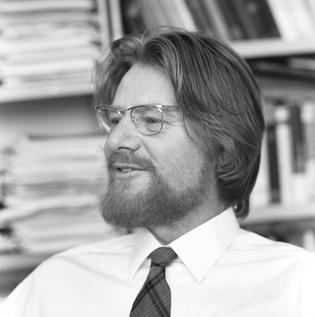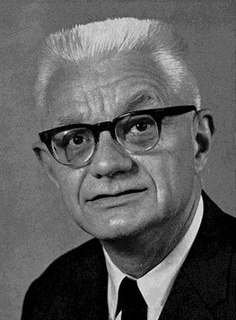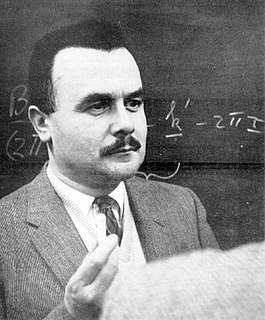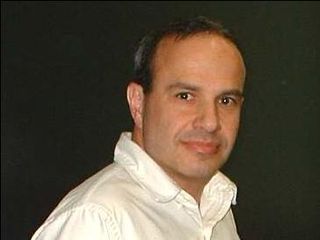A Quote by Albert Einstein
It must be conceded that a theory has an important advantage if its basic concepts and fundamental hypotheses are 'close to experience,' and greater confidence in such a theory is certainly justified. There is less danger of going completely astray, particularly since it takes so much less time and effort to disprove such theories by experience. Yet more and more, as the depth of our knowledge increases, we must give up this advantage in our quest for logical simplicity in the foundations of physical theory.
Quote Topics
Advantage
Astray
Basic
Certainly
Close
Conceded
Concepts
Confidence
Danger
Depth
Effort
Experience
Foundations
Fundamental
Give
Going
Greater
Hypotheses
Important
Increases
Justified
Knowledge
Less
Less Time
Logical
More
More And More
Much
Must
Our
Particularly
Physical
Quest
Simplicity
Since
Takes
Theories
Theory
Time
Up
Related Quotes
The concept of 'measurement' becomes so fuzzy on reflection that it is quite surprising to have it appearing in physical theory at the most fundamental level ... does not any analysis of measurement require concepts more fundamental than measurement? And should not the fundamental theory be about these more fundamental concepts?
A theory is the more impressive the greater the simplicity of its premises is, the more different kinds of things it relates, and the more extended is its area of applicability. Therefore the deep impression which classical thermodynamics made upon me. It is the only physical theory of universal content concerning which I am convinced that within the framework of the applicability of its basic concepts, it will never be overthrown.
When you look at the calculation, it's amazing that every time you try to prove or disprove time travel, you've pushed Einstein's theory to the very limits where quantum effects must dominate. That's telling us that you really need a theory of everything to resolve this question. And the only candidate is string theory.
Those experienced in work must take up the study of theory and must read seriously; only then will they be able to systematize and synthesize their experience and raise it to the level of theory, only then will they not mistake their partial experience for universal truth and not commit empiricist errors.
It is not enough for theory to describe and analyze, it must itself be an event in the universe it describes. In order to do this theory must partake of and become the acceleration of this logic. It must tear itself from all referents and take pride only in the future. Theory must operate on time at the cost of a deliberate distortion of present reality.
Is evolution a theory, a system, or a hypothesis? It is much more it is a general postulate to which all theories, all hypotheses, all systems must henceforward bow and which they must satisfy in order to be thinkable and true. Evolution is a light which illuminates all facts, a trajectory which all lines of thought must follow this is what evolution is.
For strictly scientific or technological purposes all this is irrelevant. On a pragmatic view, as on a religious view, theory and concepts are held in faith. On the pragmatic view the only thing that matters is that the theory is efficacious, that it 'works' and that the necessary preliminaries and side issues do not cost too much in time and effort. Beyond that, theory and concepts go to constitute a language in which the scientistic matters at issue can be formulated and discussed.
The theory of free speech, that truth is so much larger and stranger and more many-sided than we know of, that it is very much better at all costs to hear everyone's account of it, is a theory which has been justified on the whole by experiment, but which remains a very daring and even a very surprising theory. It is really one of the great discoveries of the modern time.
Catastrophe Theory is-quite likely-the first coherent attempt (since Aristotelian logic) to give a theory on analogy. When narrow-minded scientists object to Catastrophe Theory that it gives no more than analogies, or metaphors, they do not realise that they are stating the proper aim of Catastrophe Theory, which is to classify all possible types of analogous situations.
Scientific theories need reconstruction every now and then. If they didn't need reconstruction they would be facts, not theories. The more facts we know, the less radical become the changes in our theories. Hence they are becoming more and more constant. But take the theory of gravitation; it has not been changed in four hundred years.
Newton's theory is not 'not right', it just does not cover all distances. Contrary to popular belief, theories in science are not proven wrong, they are just replaced by more complete and convenient theories. To sound provocative, even the geocentric theory was never "proven" wrong, it is just not as convenient as the heliocentric theory, since it requires endless epicycles.


































